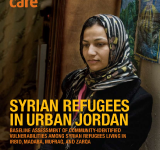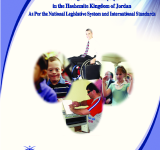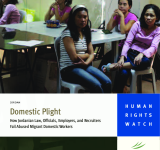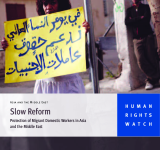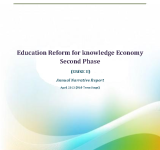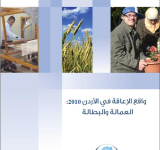This report is a baseline assessment of community-identified vulnerabilities among Syrian refugees living in Amman;; Irbid;; Madaba;; Mufraq;; and Zarqa. The purpose of this report is to identify urban Syrian refugees’ current coping mechanisms and any gaps in services available to Syrian refugees in Jordan. The research methodology is both qualitative and participatory in design;; drawing from the UNHCR tool for Participatory Assessment in Operations. This report presents only the data from household interviews;; baseline assessment;; and the follow-up focus groups conducted with community members. The number of households surveyed was 240;; with a total number of 1;;476 household members and 89 focus group participants representing 534 household members. The report proposed general recommendations and interventions to deal with the main highlighted challenges (cash assistance;; strengthening community links;; vocational training;; physical activities ...etc).
physical
This study aims to demonstrate the rights of disabled people stated by the legislator. The study shows the extent to which state and civil society institutions adhere to the implementation of applicable legislations related to people with disabilities.
يوثّق التقرير الانتهاكات القائمة بحق عاملات المنازل;; وإخفاق المسؤولين الأردنيين في محاسبة أرباب العمل ومكاتب الاستقدام التي تستقدم العاملات. كما ينتقد التقرير قوانين الهجرة وقوانين العمل المنزلي التي تيسّر وقوع الانتهاكات;; من قبيل تحديد الإقامة قسراً في البيت وفرض غرامات على تجاوز مدد الإقامة القانونية;; حتى إن لم تكن العاملة هي السبب في التجاوز.
يراجع التقرير أوضاع ثماني دول فيها أعداد كبيرة من عاملات المنازل المهاجرات;; هي لبنان والأردن والسعودية والكويت والإمارات والبحرين وسنغافورة وماليزيا. يعرض التقرير التقدم المحرز في توفير تدابير الحماية المتوفرة بموجب قوانين العمل لعاملات المنازل;; وإصلاح نظم "الكفالة" الخاصة بالهجرة والتي تسهم في الإساءة للعاملات;; وضمان فعالية استجابة الشرطة والمحاكم على العنف البدني والجنسي;; والسماح للمجتمع المدني والنقابات بالتنظيم.
The second phase of the Program Education Reform for the Knowledge Economy Program (ERfKE II) continues to build on the achievements of the first phase and follow the same implementation arrangements that have proven to be successful in (ERfKE I);; and in the same time;; focuses on schools as the locus of change as well as on the need to enhance capacity building at the central and field levels. The development objective of (ERfKE II) is to provide students enrolled in pre-tertiary education institutions in Jordan with increased levels of skills to participate in knowledge economy. Also the Mid-Term review highlighted the concrete progress achieved by (ERfKE II) in several key areas related to policy development;; quality of education interventions and school construction;; and identified the key issues as a summary of the overall progress that will be tackled and addressed during the remaining stage of implementation.
تقرير تحليلي للنتائج الرئيسية لمسح الإعاقة في الأردن;; الذي نفذته الدائرة خلال شهر تشرين الثاني 2010 بدعم من المجلس الأعلى لشؤون الأشخاص المعوقين. وغطى المسح عينة من الأسر بلغ حجمها حوالي (13) ألف أسرة بصورة تضمن التمثيل على مستوى المملكة والحضر والريف والأقاليم الثلاثة والمحافظات. واستندت هذه العينة إلى الإطار الذي وفرته نتائج التعداد العام للسكان والمساكن لعام 2004. ويهدف هذا التقرير بشكل رئيسي إلى إعطاء صورة عن مدى انتشار الإعاقة في الأردن;; والإعاقات الأكثر انتشاراً بين أفراد المجتمع الأردني;; ويتضمن التقرير منهجية المسح وأسلوب جمع البيانات والنتائج التحليلية.
